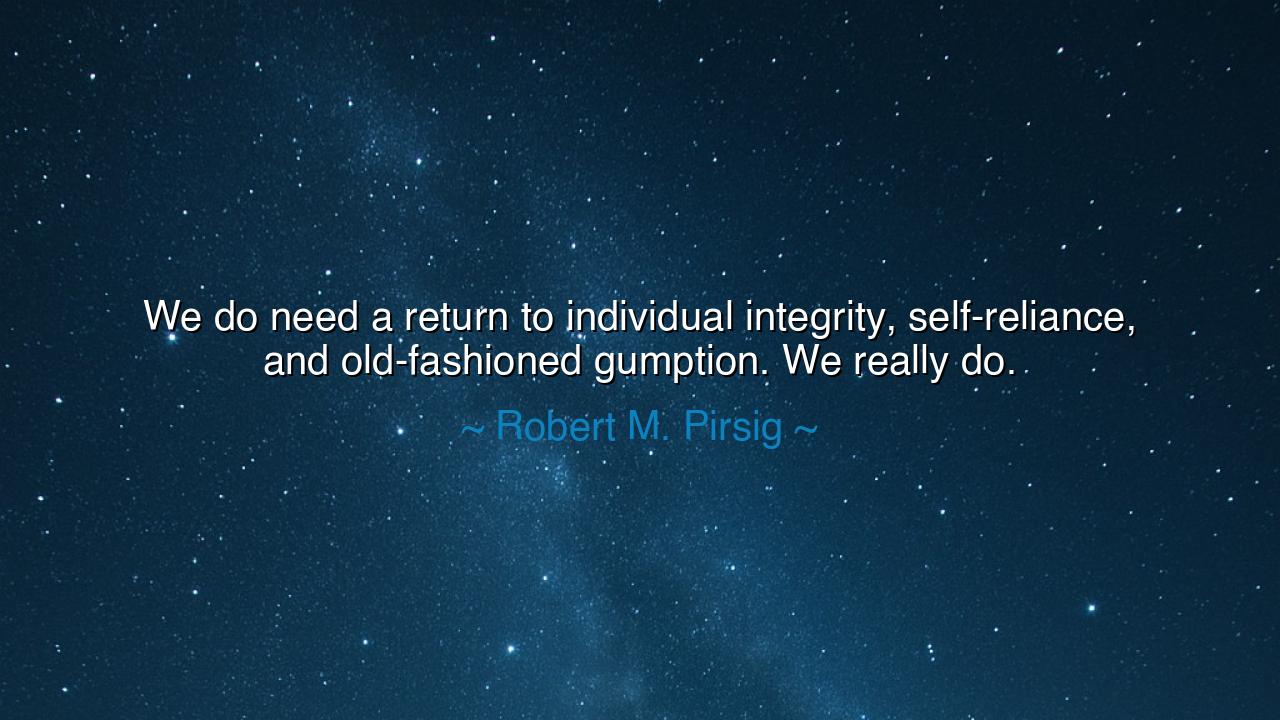
We do need a return to individual integrity, self-reliance, and
We do need a return to individual integrity, self-reliance, and old-fashioned gumption. We really do.






When Robert M. Pirsig wrote, “We do need a return to individual integrity, self-reliance, and old-fashioned gumption. We really do,” he was not merely speaking of nostalgia—he was issuing a call to arms for the soul. These words, stripped of ornament yet full of conviction, stand as a rebuke to the complacency of modern life. Pirsig, the philosopher-novelist who penned Zen and the Art of Motorcycle Maintenance, saw in the world a quiet decay: people who had forgotten how to trust their own minds, how to act from principle, how to create beauty with their hands and meaning with their hearts. His cry for integrity, self-reliance, and gumption was not a sentimental yearning for the past—it was a plea for renewal, a reminder that the spirit of humanity thrives only when it takes responsibility for itself.
The origin of this quote can be found in Pirsig’s lifelong struggle to unite intellect and soul, reason and purpose. In Zen and the Art of Motorcycle Maintenance, he tells the story of a man seeking “Quality”—not merely in machines or in craftsmanship, but in life itself. He saw the mechanical world not as lifeless, but as a reflection of human care. When one loses care, machines break down; when one loses integrity, societies crumble. Thus, Pirsig called for a return—a return not to the past, but to the virtues that built civilizations: the honesty of one’s work, the courage to stand alone, and the perseverance to repair rather than discard. In his time, as in ours, he saw the creeping sickness of dependency—on systems, on experts, on convenience—and he sought to awaken the old spirit of self-sufficiency that once defined the free man.
To possess individual integrity is to be whole—to live so that your words, thoughts, and actions are one. It means refusing to live by pretense, to bend your values for comfort or approval. Integrity is the inner alignment between the soul and the deed. Without it, no system of law or government can save a people. The ancients called it virtue—the power to be upright even when no one is watching. To walk in integrity is to carry light through the world, for it reveals the path not only for oneself, but for others. Pirsig reminds us that integrity cannot be granted; it must be forged, tested, and renewed daily in the small decisions of life.
Self-reliance, too, is not the isolation of the proud, but the independence of the wise. To be self-reliant is to trust one’s own mind, to build with one’s own hands, to take responsibility for one’s own condition. It is the discipline to learn, to work, and to create without waiting for rescue or recognition. The world teaches dependence—on comfort, on approval, on systems that promise ease. But the soul knows that growth begins when the crutch is cast aside. Emerson once said, “Nothing can bring you peace but yourself.” Pirsig’s call echoes that truth. When we learn to stand on our own feet, we rediscover the divine dignity that was always ours.
And what of old-fashioned gumption? It is the forgotten virtue of effort—the stubborn courage to begin, the patience to persist, and the heart to finish. Gumption is the spark that moves dreams from thought into action. It is not brilliance, but determination; not genius, but grit. It is what drove the pioneers across vast wilderness, what pushed inventors through a thousand failures before success. Consider Thomas Edison, who, when asked how he endured countless failed experiments, said, “I have not failed. I’ve just found 10,000 ways that won’t work.” That was gumption—the belief that every setback is another step toward mastery. Pirsig saw that modern life, dulled by convenience, had lost this fire. To reclaim gumption is to reclaim the joy of struggle, the nobility of labor, the victory of endurance.
The ancients would have recognized Pirsig’s words as a call to balance the inner and outer life. For a civilization cannot stand on machinery or wealth alone; it must be upheld by the unseen pillars of character. The fall of every great empire begins not with invasion, but with corruption of the self—when integrity is traded for comfort, self-reliance for entitlement, and gumption for indifference. Thus, Pirsig’s voice is not merely that of a modern thinker, but of a timeless sage. He asks us to remember that the measure of progress is not how much we own, but how much we can do rightly, alone, and with conviction.
So, my children of the present age, hear this teaching and carry it in your hearts: return to your integrity, to your self-reliance, to your gumption. Be honest with yourselves, even when the truth wounds. Do not depend on the world to define your worth; earn it through your deeds. When you fail, begin again. When you doubt, stand firm. Live not as a cog in a machine, but as a craftsman of your own destiny. For the world does not need more followers—it needs builders of spirit, thinkers of courage, and doers of steadfast will.
And so, let the words of Robert M. Pirsig echo like a hammer upon the anvil of your soul: “We do need a return to individual integrity, self-reliance, and old-fashioned gumption. We really do.” Let them not be mere nostalgia, but a summons. Rise to your work each day with care, live by your word, and dare to create something worthy of your time on this earth. For when you live with integrity, rely upon yourself, and act with gumption, you do not merely exist—you build, you lead, you honor the sacred calling of being human.






AAdministratorAdministrator
Welcome, honored guests. Please leave a comment, we will respond soon